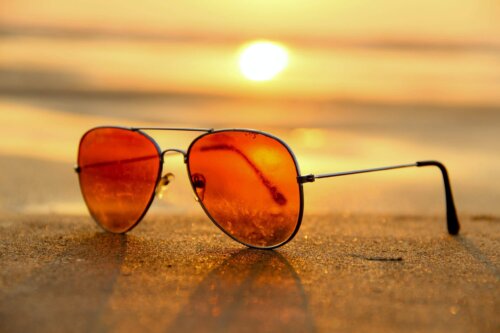Time for New Sunglasses? Make Sure They Really Protect Your Eyes


Every year, when summer rolls around once again, most of us have one simple wish in the back of our minds: Let there be sun! Whether we’re jetting off on holiday or simply hoping to make the most of the weather at home. No matter where we’re getting our solar fix from, though, we are always careful to take along our sun cream, hats, and sunglasses. But how can we be sure that our trusty sunnies are really providing the protection our eyes need?
Our eyes are among the most important organs we possess. They provide us with an invaluable asset: our vision. These complex and sensitive organs are more exposed than any other in our bodies (except from our skin) – and let’s face it, they would be pretty useless, otherwise! But this exposure can put them at risk of damage, not only from dust and bacteria but also from the sun – and this isn’t only an issue on hot summer days.
With the vast array of options out there, from designer shades to beachfront bargains, it can be hard to know exactly what you should be looking for in a pair of sunglasses. So, we’re breaking it down for you. Read on to find out what qualities should you consider when picking out sunglasses that really will protect your eyes.
1. UV Coating
This is probably the most obvious – but it is also the most important thing to look out for when you’re on the hunt for your next pair of sunnies. Ultraviolet rays sit on the high end of the spectrum of electromagnetic radiation, just below X-rays. They’ve been linked to everything from skin cancer and cataracts to macular degeneration and photokeratitis.
Ensuring your shades block the vast majority of ultraviolet radiation means you protect your eyes from UVA, UVB, and UVC rays, which are all known for their uniquely damaging effects on both the eyes and skin.
Opt for a pair that is clearly labelled “100% UV Protection”. This means that the lenses offer 100% protection against both UVA and UVB rays, or “100% protection against UV 400”. This is particularly important if you are often in high-exposure environments, such as at high altitudes. But it is also important to remember that even in places where you would think UV exposure would be a problem: research by the Met Office shows up to 80 percent of UV-A can come through clouds!
2. Mirror and Anti-Reflective Coating
Another component that can help protect your eyes from UV light is mirror coatings. These are applied on the front of the lenses and work to reflect harmful UV rays away from your eyes – just like a mirror. In addition to offering a second barrier of protection against harmful UV exposure, this can also help to reduce squinting and eye strain.
Anti-reflective coatings, or AR coatings, can also help to further reduce reflection. The coatings prevent light from reflecting off the back of the sunglasses, getting rid of any annoying reflections while also making for a clearer image.
3. Polarised Lenses
Despite their popularity, polarised lenses don’t technically protect against UV rays. Instead, they work by helping to filter out reflected light, such as light that bounces off water or snow. This makes activities such as driving and skiing in environments with a high amount of reflected light much safer.
While sunglasses with polarised lenses will typically also have a UV coating, it is still important to make sure they provide adequate UV protection.
4. Larger Lenses
Fashion trends are ever-changing: one season, huge, oversized glasses are the must-have style and the next year, every fashionista is opting for tiny barely-there frames. But while trends come and go, the need for maximum UV protection is a constant. And when it comes to your sunglasses, bigger really is better.
Larger frames that cover more area around your eyes themselves work harder to reduce the amount of light that reaches your eyes – including the delicate skin around them. If you spend a lot of time outdoors – especially around snow or water – it is a good idea to invest in a pair of large-frame sunglasses. You may also consider opting for a pair of wraparound sunglasses with complete UV protection that have the added bonus of protecting your eyes from wind that can cause dryness.
5. Coloured Tints
Today, sunglasses are available in every colour and tint you can imagine. But while it’s easy to assume that this endless array of colours is just for aesthetic purposes, this isn’t always the case.
When it comes to sunglasses, you might assume that darker lenses are better for your eyes. But this isn’t necessarily true. In fact, as darker lenses make the world around you appear darker, too, they can cause your pupils to dilate, allowing more radiation to enter your eyes. So, what about other colours?
Well, green- and blue-tinted glasses can help to filter blue light and reduce glare. They also offer a clearer image and the highest contrast of any tint, making them particularly popular among sportspeople, from golfers to fishing fanatics.
Yellow or gold tints can help to reduce exposure to blue light; amber and brown tints can reduce glare but also allow higher frequency colours and some UV rays to pass through, while rose and purple tints offer high contrast against blue or green backgrounds—making them a popular choice for hunting and water skiing.
6. Sunglasses aren’t just for summer
While we might associate sunglasses with hot, sunny days, it’s important to remember that they are actually an essential bit of kit all year round.
It’s easy to assume that our eyes are safe if we are out of direct sunlight, but this simply isn’t the case. Even if it’s cool or cloudy outside, the damage posed by UV light can be just as serious. In fact, our unwittingness may leave us exposed to these harmful rays much more than we realise. Be sure to check UV forecasts (such as the UV index forecast on the Met Office website) and grab your sunnies even if it’s overcast outside!
The most important thing to remember when you’re off shopping for your next pair of sunglasses? They’re not just a fashion statement. Be sure to follow the guidance in this article and invest in a pair that will truly protect your eyes from UV rays – no matter the conditions.
A great pair of sunglasses should eliminate UV rays, cover a good portion of your face, and eliminate or decrease the amount of reflected light. It’s certainly possible to find sunglasses that have all of these essential features, all you need to do is do a little research and make sure you’re buying from a trusted brand.
If you’d like to learn more about what you can do to protect your eyes, get in touch with one of our friendly clinic coordinators. To find out about our treatments, Book a Consultation today.

